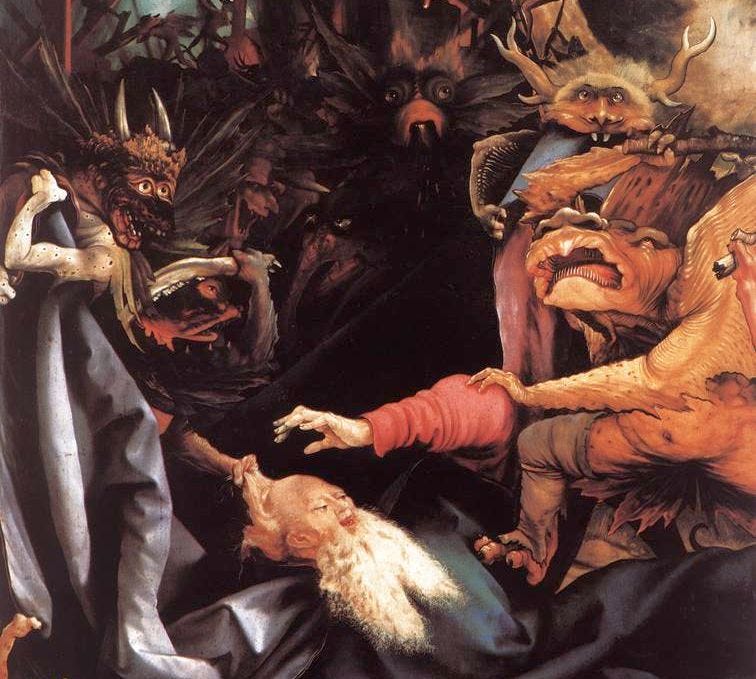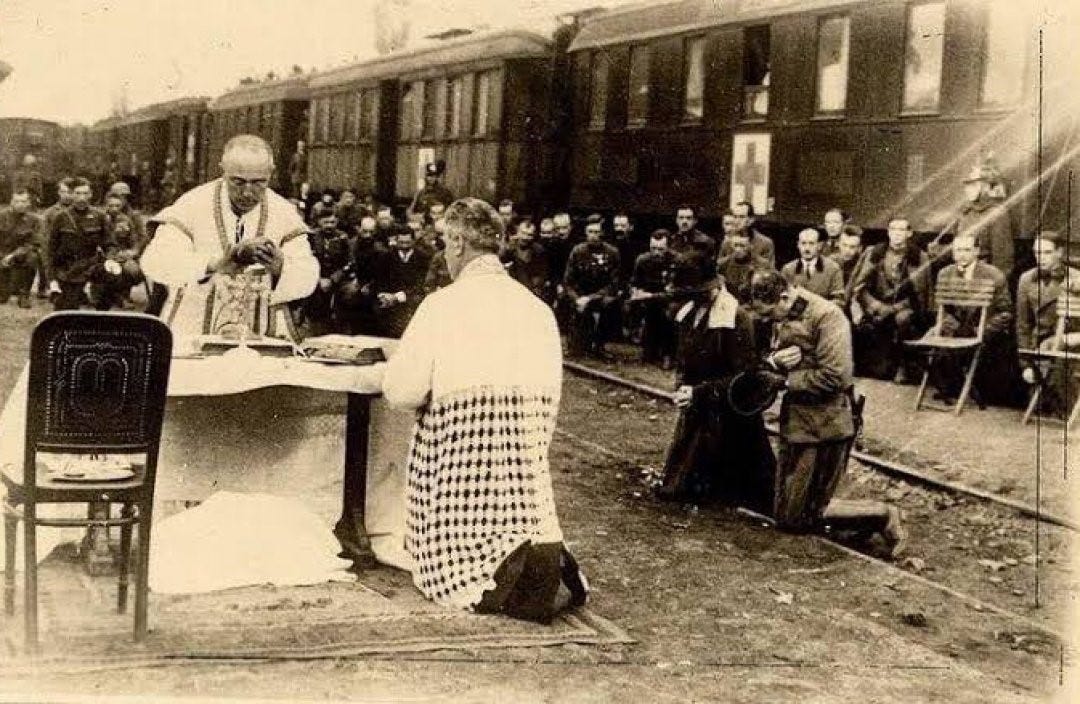Three Deadly Giants and How to Fight Them
Wisdom from the Desert Fathers for Today's Catholics

A significant part of the articles and discussions held in traditional and conservative Catholic circles describe and lament the current situation of both the world and the Church. If we notice that unlike the era before the French Revolution (1789), in our times sin has not only become widespread but has also been institutionalized through so-called ‘laws’ that directly contradict the Ten Commandments and the Christian Gospel, this is an easily understandable fact. Instead of attempting to describe the extent of the social and institutional disaster of our days, I will simply state that everything proves the truth of the words of the Saint John, the Eagle of Patmos, who affirms that “the whole world is seated in wickedness” (1 John 5: 19). But what is the root of such a situation? What is lacking in the Church and the world today? The answer, I think, is self-evident: saints. We lack saints.
Would You Like to Meet a Saint?
Imagine for a moment: wouldn’t you wish to speak right now, in person, as it was possible over fifty years ago, with Padre Pio? Wouldn’t you like to personally know a Pope like Saint Pius X? Or to live in a diocese led by a theologian and Doctor of the Church like Saint Alphonsus Mary of Liguori? Or, almost a century before him, Saint Francis of Sales? Or wouldn’t you want to participate in a Holy Liturgy where Blessed King Charles I of Austria would be present together with his wonderful wife, Empress Zita? Who would say no? What I want to suggest through such questions is a very precise thing: our problem, the problem of the entire world today, and equally that of the militant Church, is the lack of saints. True saints, I mean. Saints who worked miracles, like Saint Joseph of Cupertino. Saints like Augustine, Gregory of Nazianzus, and Athanasius the Great who dispersed the clouds of heresies and lightning-struck heretics with orthodox teachings. Saints whose prayers obtained graces for the conversion of millions of unbelievers, just as Saint Teresa of Ávila and Saint Thérèse of Lisieux did.
“You Shall be Holy”
But what do we do when we don’t have such saints? When we no longer see them, when we can’t find them anywhere in this poor, fallen world? God Himself gave us the answer through the Holy Apostle Paul:
You shall be holy, for I am holy (1 Peter 1: 16).
Yes. This is the answer: we ourselves must become saints. God’s call to holiness applies to all of us, not just to some legendary personalities. And even if we are not sure we will succeed, we must strive. Let’s start, at least. But where do we begin? Well, the solution also come from the saints: reading the books written by them.
For instance, if we read the ancient ascetic writings of the great fathers of the desert, such as Anthony the Great or Macarius of Egypt, we see that their main concern was to defeat evil in order to fulfill the divine call to holiness. But this depends directly on our awareness of the terrible war in which we are all involved, incessantly, in this fallen world. A war about which the Holy Apostle Paul shows us that it is not a usual one, for “our wrestling is not against flesh and blood; but against principalities and powers, against the rulers of the world of this darkness, against the spirits of wickedness in the high places” (Ephesians 6: 12). The lives of these saints and their writings are a testimony of how the unseen war can be fought and won. That is why I will never tire of recommending one of the most fruitful books that can be read by a Christian: Apophthegmata Patrum Aegyptiorum (The Sayings of the Desert Fathers).
Saint Marcus about “Three Giant Killers”
One of the monks of this kind, about whom we do not know much apart from the fact that he lived in the 5th century after Christ, is Saint Mark, surnamed—due to his austere way of life—“the Ascetic.” His writings, although dealing with certain doctrinal issues such as the capacity of good deeds to be meritorious, mainly address the moral and spiritual problems faced by those who seek salvation. When asked by one of his disciples, Nicholas the Solitary, how to confront certain temptations, the holy father wrote a letter containing valuable teachings. From the entire content of this remarkable text, we highlight the heroic model that must always be kept in front of our eyes: it is none other than that of David facing Goliath. In other words, when confronting evil by fighting his weaknesses, concupiscence, the allurements of the world, or the temptations from the devil, every Christian finds himself in the same situations as David, who confronted Goliath. The only difference is that the giant we must confront is not just one. This is where the exceptional contribution of Saint Marcus comes in:
Imagine that there are three powerful and mighty giants of the Philistines, upon whom depends the whole hostile army of the demonic Holofernes (Judith 2:4). When these three have been overthrown and slain, all the power of the demons is fatally weakened. These three giants are (…) ignorance, the source of all evils; forgetfulness, its close relation and helper; and laziness, which weaves the dark shroud enveloping the soul in murk. This third vice supports and strengthens the other two, consolidating them so that evil becomes deep-rooted and persistent in the negligent soul. Laziness, forgetfulness and ignorance in their turn support and strengthen the other passions. Helping each other, and unable to hold their position apart from one another, they are the mainstay and the chief leaders of the devil's army. Through them the whole of this army infiltrates into the soul and is enabled to achieve its objectives, which otherwise it could not do.
As a true strategist, Saint Marcus the Ascetic reveals to us who are the ‘generals’ of all vices and passions that assail us: ignorance, forgetfulness, and laziness. Being aware, as Saint Alphonsus teaches us, that prayer is the foundation of any good work, we will reflect on these giants to see how we can combat them.
Defeat the ignorance
The virtue of religion depends essentially on a good understanding of faith—summarized in the so called Symbol of Faith (i.e., Credo)—and morality—rooted in the Ten Commandments. That’s why, in the early days of Christianity, after the Church surpassed the unstable period of persecutions, religious instruction through catechesis was mandatory. Sometimes, this could even last for three years to four (or even five) years. Thus, the (1) Creed and the (2) Ten Commandments were taught first, followed by instruction on (3) the meaning and value of the Sacraments and, of course, (4) guidance on a life of prayer in the period leading up to receiving Baptism.
All these four parts became integral to Christian catechesis and remain valid forever. Each of us can examine ourselves to see if we have a complete, simple, and clear understanding of the Creed, the Ten Commandments, the Sacraments, and Prayer. Reading the Old and New Testament, the Roman Catechism (written after the conclusion of the Council of Trent and published in 1566), and the small catechisms designed by Saints like Roberto Bellarmino or Pope Pius X should be constant concerns, if not daily practices. In any case, the effort to know, deepen, and live our faith to the best of our ability is the sure means to overcome ignorance.
Defeat the forgetfulness
I often like to watch old film recordings with my wife and children, showing scenes from people’s lives over 100 years ago. Just search for keywords like “old New York movie,” and you will discover videos like this one:
Why do we do this? To remind ourselves of what none of us have ever seen. A world where decent clothing, respect, hierarchy between genders, modesty, shame, and other Christian values were constantly present in the lives of ordinary people.
Or photos like this one, where we see Blessed King Charles I of Austria kneeling next to Queen Zita at Holy Mass, in front of the King of the Universe:

All of these are meant to help us fill our memory with sacred memories. To remember what it meant to be a Christian in a world where the laws that governed society were based on the Revelation contained in the Christian Gospel. At the same time, we must read and recite prayers, psalms, verses from Holy Scripture to learn them by heart. And, of course, we can do the same by singing as many Gregorian chants as possible. Thus, instead of filling our memory with useless news or useless discussions, we will acquire a ‘treasure’ on which we can meditate whenever we want, wherever we are.
Defeat the laziness
Probably no enemy is more formidable today than comfort, convenience. Instead of reading the Catechism, or the Bible, or increasing our prayers, or attending a priest who provides sound catechesis, we are tempted to waste time browsing the internet or, especially, immersing ourselves in the dangerous ocean of social media. Confronting this ‘giant’ can only be done with great tenacity, repeatedly resuming whenever we find that we are not fulfilling what we have set out to do.
Giving a certain priority to those readings and activities designed to help us combat the first two ‘giants’ would be an ideal beginning to conquer laziness. Also, fulfilling the duties of our state requires sustained effort, like that portrayed in some country music pieces telling the story of a grandfather who fought in two wars and worked as if three to raise his nine children, all without ever complaining. Yes, we must admit that our ancestors often had it better in this regard. But nothing prevents us from recalling their Christian values and applying them in our own lives.




We will have few saints until we completely reject the pseudo psychospirituality that began to infect the Church in the 60s. Look at how it has decimated religious orders. Without a return to traditional Catholic spirituality it is unlikely we will see an increase in true saints.
Living in the world of traditional Catholicism, visiting traditional monasteries and being ministered to by traditional priests, I am confident these times have their share of saints. Not enough of them, of course, but amazingly and thanks to God, a lot of them nevertheless.